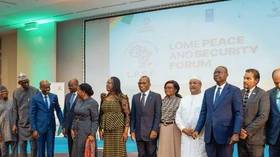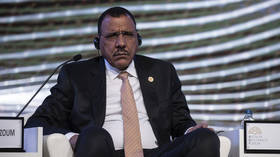African governments discuss root causes of coups

The first Lome Peace and Security Forum (LPSF), hosted by the Togolese government’s African Political Alliance (APA), concluded on Sunday, with delegates urging African nations to address the structural causes and conditions that promote unconstitutional government takeovers.
The three-day forum, supported by the African Union (AU), began on Friday with a meeting attended by Togolese President Faure Gnassingbe and foreign ministers from several countries, including those in the Sahel region, such as Mali, Burkina Faso, and Niger, where coups have recently occurred.
Several officials from countries led by coup-installed leaders emphasized the need for local solutions to political crises at the conference, which was themed on “How to Strengthen Political Transitions to Democratic Governance in Africa?”
In a statement on Sunday after the forum, the APA emphasized that “foreign interference and the geopolitical interests of the great powers are likely to aggravate the fragility” of African countries, as well as “threats to peace, stability, democratic consolidation, and development.”
While the Economic Community of West African States (ECOWAS) has insisted on zero tolerance for unconstitutional government changes, four of its 15 member states have transitioned from contested and fragile democracies to military regimes in the last three years.
There have been six military takeovers in the French-speaking West African region since 2020, including two in Mali, two in Burkina Faso, one in Guinea, and a recent one in Niger. The coups have followed the same trend of soldiers accusing the government of failing to deliver the benefits of democracy. Military rulers in Bamako, Ouagadougou, and Niamey have also accused France of internal interference and severed military ties with the former colonial power.
On Sunday, the APA reiterated the “African Union’s zero tolerance for unconstitutional changes of government,” arguing that “undemocratic means to power accentuate fragility of the state, weakens national institutions and the rule of law, and undermines social cohesion.”
The organization, however, insisted on a peaceful resolution to political crises on the continent, calling on “regional and international organizations to avoid conflict and overlapping agendas in monitoring and supporting political transitions.”
This statement comes amid a threat by ECOWAS to use force in Niger to restore the rule of President Mohamed Bazoum, who was deposed on July 26. The coup leaders in Niamey have announced plans to transition to civilian control in three years, but the regional authority has rejected the timeline, calling it a provocation.
In Mali, presidential elections are now scheduled for February 2024 after the military rulers failed to hold them last year as promised, defying regional and international pressure to return to civilian rule.
Meanwhile, in Burkina Faso, the military government announced last month that no elections would be held until the country, which is battling jihadist insurgencies, is safe enough for everyone to vote.













